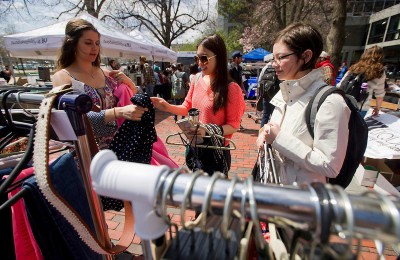
Boston University kicked off its inaugural Gender Advocacy and Progress Week Monday, and until Sunday, will host several panels, conferences, presentations and lectures aimed at shedding light on pervasive gender inequalities that exist on and off campus.
One GAP Week event, however, is taking on gender inequalities in a playful way.
From 5 p.m. to 10 p.m. Wednesday and Thursday, BU students will have the opportunity to sell their clothes with UNItiques, an online marketplace where college students can buy and sell secondhand goods on their own campus, during the company’s Spring Break Closet Cleanout event.
Students can take any clothes they’d like to sell to UNItiques’ on-campus offices to have their items professionally photographed and posted to their own UNItiques store. The clothes can be modeled by the seller or by a UNItiques model. Sellers who model their own clothes for photographs will also be given a free LinkedIn headshot.
Alternatively, sellers can leave their items with UNItiques and let the company sell their items for them, with a caveat. Although sellers who choose this option will receive 100 percent of the profit, they leave pricing decisions entirely up to UNItiques. It is also up to the discretion of the company to decide when to donate clothes that have not been sold after several weeks.
The event became part of GAP Week when the 23-year-old UNItiques founder and CEO, Alexandra Shadrow, was invited to be a panelist at Saturday’s Women Mean Business Conference, hosted by the BU club herNetwork.
Shadrow, a 2015 graduate of BU’s College of Communication, said although she initially envisioned her company as a “college Craigslist,” she decided to refine its scope after the website’s initial launch.
“Even though UNItiques can be used by any student to sell anything, we focused our brand on girls and clothing,” Shadrow said. “We are who our members are, and our members are college girls buying and selling fashion. That’s who really gets the most benefit out of using UNItiques.”
UNItiques was conceived as a solution to the problems Shadrow encountered while using other online secondhand marketplaces. Shadrow emphasized that one of the most important aspects of UNItiques, especially for young women, is that it is a much safer platform on which to buy and sell items. Users buy from and sell to other students on their own campus and are able to negotiate with each other directly through the website.
In addition to being safer, Shadrow said UNItiques strives to be a greener and more cost-effective option for college students. In allowing members to buy secondhand clothing from people their own age, the company’s leaders hope to encourage reuse and recycling while also saving their users money.
As a company that focuses primarily on its female user base, another part of UNItiques’ mission is to enable college students, especially girls, to be entrepreneurs by “turning their closets into stores.”
“Alex has built this company up all by herself, and I think it’s a great model for young women getting out there and starting their own businesses and doing what they want to do,” said Jess Linnett, a freshman in the College of Communication and a model for the UNItiques website. “I really believe in this idea.”
UNItiques is also staffed almost exclusively by women, a decision Shadrow made to help combat gender inequalities in the tech industry. The push to do so, she explained, was a women’s studies class she took last summer that gave her a better understanding of gender inequality in employment opportunities.
“The playing field is already so unbalanced towards men, where men are getting better jobs and better pay,” Shadrow said. “And for me, it’s my mission to level the playing field and make this company just women. We are for girls, and we are run by girls. That’s the goal.”
Natalie Odrich, a sophomore in the College of General Studies and a UNItiques intern, expressed support for Shadrow’s vision of a female-run company.
“I think it’s really empowering, knowing that it’s just women working together in this environment where we’re all in it together,” Odrich said. “We’ve all bonded really well.”
As a young woman running her own company in the tech industry, Shadrow said she knows she is treading on male-dominated territory. When asked about how other young women aspiring to be entrepreneurs might find success in an industry so often controlled by men, she advised girls to be ready for a challenge.
“Expect things to be difficult, because they will be,” Shadrow said. “And when things are their hardest, find a different path. Giving up is not an option. There are always solutions.”




